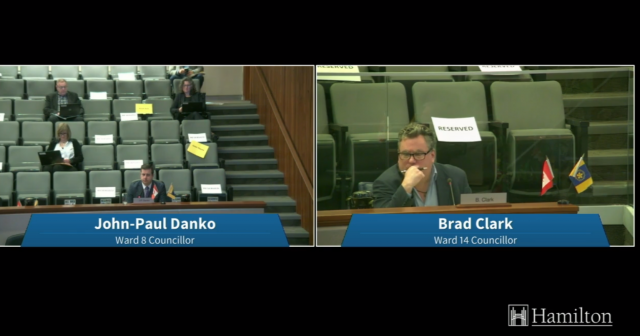Hamilton politicians have voted to offer property tax relief while finalizing the city’s 2020 operating budget and approving a 2.9 per cent residential tax increase on Friday.

Councillors met at city hall, which is closed to the public as a result of the COVID-19 pandemic to address time sensitive issues.
In keeping with “social distancing” protocol, councillors and senior staff were spread throughout the council chamber rather than at their usual positions around a horsehoe.
Acting on the advice of General Manager of Finance Mike Zegarac, councillors voted to alleviate the immediate impacts of the pandemic on municipal taxpayers and to not create more hardship for residents who are in “a difficult financial situation”, by waiving penalties and interest for 30 days after a first tax installment payment deadline of April 30th.
Zegarac says waiving penalties for 30 days will also give his staff time to report back to city council with a more “wholesome, fulsome list of options or scenarios as it relates to not only property taxes, but potentially other fees and charges such as water and wastewater.”
He notes that about one-third of Hamilton property owners pay taxes through their financial institution, calling that “an example of how we really need to think through what outcome council wants to achieve and how we get there as it relates to providing relief.”
Zegarac also stresses that the city has other existing programs that remain in place including a tax deferral program for seniors and those on low-incomes and a senior’s tax rebate program.
- Alberta to overhaul municipal rules to include sweeping new powers, municipal political parties
- Norad looking to NATO to help detect threats over the Arctic, chief says
- Grocery code: How Ottawa has tried to get Loblaw, Walmart on board
- Military judges don’t have divided loyalties, Canada’s top court rules
Stoney Creek Coun. Brad Clark presented the 30 day tax relief motion saying it sends “a pretty clear message that we’re trying to do what we can to help during this crisis.”
Hamilton Mayor Fred Eisenberger says that the city, provincial and federal governments all have a role to play. He adds that “how we fit into that needs to be assessed based on the entire financial package and we’re going to do what what we need to do to help our citizens get through this.”
One late change to the city’s 2020 operating budget ensures a “living wage” for all non-union, part-time staff at a cost this year of $216,000.
Only Ward 14 Coun. Terry Whitehead voted against the budget, and the 2.9 per cent tax increase, saying he’s unable to support any hike above the rate of inflation.
Whitehead points to seniors on fixed incomes saying “many of them are having challenges, they sell off whatever they have to stay in that home as long as they can, cash poor and eventually they have to sell their home and move out of the neighbourhood.”
Coun. Clark agrees that he’s “not thrilled” with 2.9 per cent, but “given the public health emergency that we’re under, given the timing crunch that we’re under, I can’t in good conscience vote against this budget.”








Comments